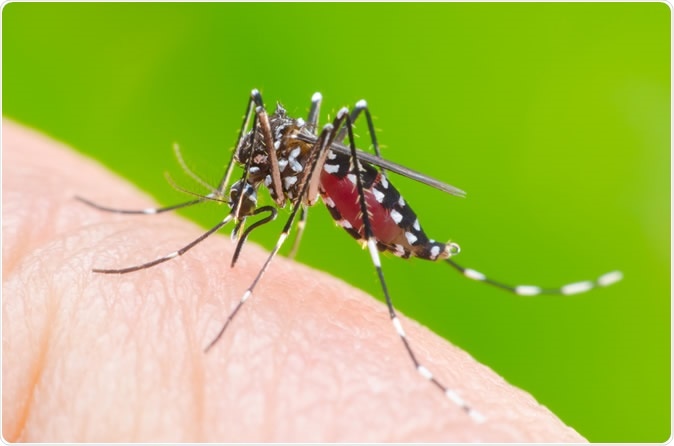
Super macro aedes aegypti mosquito on human skin. Image Credit: khlungcenter / Shutterstock
In the study published in PLOS Neglected Tropical Diseases, the researchers found that control measures also depend on the commuting and movement patterns of humans. Hence, evaluating how humans commute is key to successful mitigation planning.
"We have advanced our understanding of how much information cities need to make good cost-effective public health decisions," Nina Fefferman, co-author and a professor in UT's Department of Ecology and Evolutionary Biology, said in a statement.
Studying human commute and behavior
The researchers wanted to investigate whether solely vector control can curb mosquito-borne illnesses. They developed a model and four control scenarios, ranging from highly focal to area-wide larval control. In addition to that, they also modelled commuting patterns after three major tropical urban centers – Recife, Jakarta, and San Juan.
These areas were recently exposed to dengue or Zika infections. They wanted to determine if human population distributions and resulting commuting flows affect the scale at which control actions should be implemented.
Humans who were bitten by infected mosquitoes in a part of the city can spread the illness to a mosquito that bites them in another place or community. With the commuter flow and human distribution model, planning an attack depending on human behavior is important. It can help health officials determine mosquito control strategies.
It’s important to study human behavior because it can project movement patterns of those who are infected, potentially carrying the illness to another place or even country. Human behavior plays a pivotal role in determining the outcome of emerging epidemics. Local commuting and travel, for instance, can influence both the global spread of disease-causing microorganisms and local clustering of cases.
Hence, vector control won’t become as effective if people travel from one place to another. Determining key strategies can be done depending also on human movement.
“Considering the movement of humans could therefore conceivably improve our ability to target both the areas of origin and the areas where onward transmission may occur, or at least to help reduce costs associated with those efforts,” the researchers wrote in the study.
“Our results suggest that the overall best choice of strategy will largely depend on decision-makers’ willingness and ability to invest in control measures (which is likely to be location specific and may even vary within cities, depending on the organization of vector control), and the efficacy of control methods,” they added.
Mosquito-borne illnesses in a view
Mosquito-borne illnesses caused by the Aedes species include yellow fever, dengue, Mayaro, chikungunya, and Zika fever. The World Health Organization (WHO) reports that the Aedes aegypti mosquito is the main vector that transmits the virus that can cause the abovementioned diseases.
Dengue, for one, can be life-threatening if it’s not treated immediately. It could lead to a condition called dengue hemorrhagic fever (DHF) that can lead to bleeding and circulatory collapse or shock.
More than 40 percent of the population across the globe in more than 100 countries are at a risk of dengue infection. Southeast Asia, the Americas, and the Western Pacific had the most significant dengue epidemics over the past few years.
Journal reference:
Stone, C., Schwab, S., Fonseca, D., and Fefferman, N. (2019). Contrasting the value of targeted versus area-wide mosquito control scenarios to limit arbovirus transmission with human mobility patterns based on different tropical urban population centers. PLOS Neglected Tropical Diseases. https://journals.plos.org/plosntds/article?id=10.1371/journal.pntd.0007479